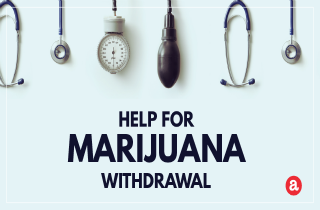Marijuana produces withdrawal symptoms when someone who has become physically dependent quits using it. What is withdrawal from marijuana like? The symptoms are similar in type and severity to those of nicotine withdrawal: irritability, sleeping difficulties, anxiety, and craving…which peak a few days after regular marijuana use has stopped.
Withdrawal symptoms can make it hard for someone to stay off marijuana. So how can marijuana withdrawal be treated and how can you ease the associated discomfort? We answer these questions and more in the article below. Then, we invite your questions or comments about getting (and staying) off marijuana at the end.
Is marijuana withdrawal dangerous?
No.
Relatively speaking, marijuana withdrawal can be characterized as a mild set of physical and psychological symptoms. Most symptoms begin during the first week of abstinence and resolve after a few weeks. In fact, only abbout half of patients in treatment for marijuana addiction have reported symptoms of the marijuana withdrawal syndrome. The main symptoms of marijuana withdrawal are:
- anxiety
- cravings
- decreased appetite
- depressed mood
- disturbed sleep
- gastro-intestinal symptoms
- irritability
- restlessness
Is marijuana withdrawal hard?
It depends.
The severity and intensity of detox vary on a case-by-case basis. Most symptoms are related to duration of use, frequency of use, and dosing amounts. So, in principle, the longer or more often you used marijuana, the more difficult the withdrawal. While there is no one best way to withdraw from marijuana, it can help to plan for psychological and social support.
Marijuana withdrawal methods: Help for marijuana withdrawal symptoms
Preparing for marijuana withdrawal symptoms treatment is more than simply addressing physical symptoms. People who want to stop smoking weed need to look into the psycho-emotional reasons for using marijuana to cope with life, stress, or anxiety. Relatively mild withdrawal effects and desire to pursue reducing — rather than abstaining from — use can lead to relapse. This is why many people overcome dependence to weed only after multiple treatment exposures.
Studies show that effectively treating marijuana use disorder via standard treatments involving medications and behavioral therapies may help reduce cannabis use, particularly among heavy users and those with more chronic mental disorders. These can include:
- Behavioral treatments
- Contingency management
- Family based treatments
- Group or individual cognitive behavioral therapy
- Motivational enhancement therapy
Help with marijuana withdrawal
Researchers are testing different ways to help marijuana users stay off the drug, including some medications. There is a significant increase in the number of treatment admissions for marijuana use disorders in the past few years, and the majority of marijuana-dependent individuals who enter treatment have difficulty in achieving and maintaining abstinence. Thus, there is increased need for medications that can be used to treat this population
However, current treatment programs focus on counseling and group support systems during withdrawal from marijuana. There are also a number of programs designed especially to help teenagers. And so far, no medication has been shown broadly and consistently effective; none has been approved by any national regulatory authority.
Natural help for marijuana withdrawal
For some of the milder detoxing symptoms, a few home remedies have proven to be useful. These can include:
- Drink cranberry juice to help purify and cleanse the body.
- Drink plenty of water and clear liquids.
- Eliminate fat from the diet until digestion is better.
- Exercise not only helps depression and other unpleasant emotions, it helps the body speed up the healing process.
- Greatly reduce or eliminate caffeine until the sleep pattern is more normal or restlessness is gone.
- Hot soaking baths can address emotional and physical symptoms.
- Really excessive sweating can deplete the body of potassium, a necessary mineral. A few foods high in potassium are: melons, bananas, citrus fruits, green leafy vegetables, and tomatoes.
- The old fashioned remedy for insomnia, a glass of warm milk before bedtime, helps some people.
One way to address symptoms related to sleep disturbance is to look to increase melatonin during withdrawal. Marijuana deepens our overall sleep, so it may help us get off to sleep and encourages the deep sleep we need to rejuvenate our bodies in the first half of the night. Unfortunately, it also tends to inhibit our brains’ ability to enter the light REM or dreaming sleep we achieve in the second half of the night. This is why people often notice that they no longer dream when they use marijuana.
Instead of using marijuana you can maximize your own natural melatonin production. When you expose your eyes to bright light especially from the new tablets and smart-phones it prevents melatonin release, even a short exposure to blue light will shut down melatonin production for several hours. You need to create normal darkness before bed so you can switch on your melatonin production. Or look into melatonin supplements for help with sleeping.
How to ease marijuana withdrawal?
Any questions about helping ease marijuana withdrawal? Do you have suggestions or experience to share? If you have ANY feedback, please feel free to share by sending us a message in the section below. We are eager to hear your experience and will respond to legitimate queries personally and promptly.









Related Posts